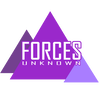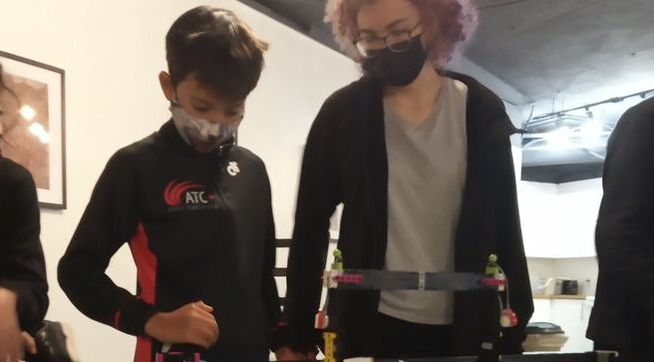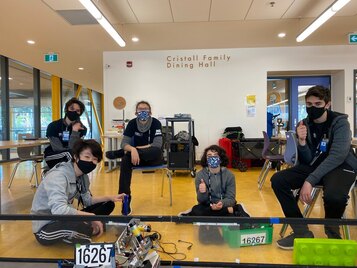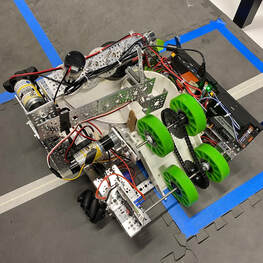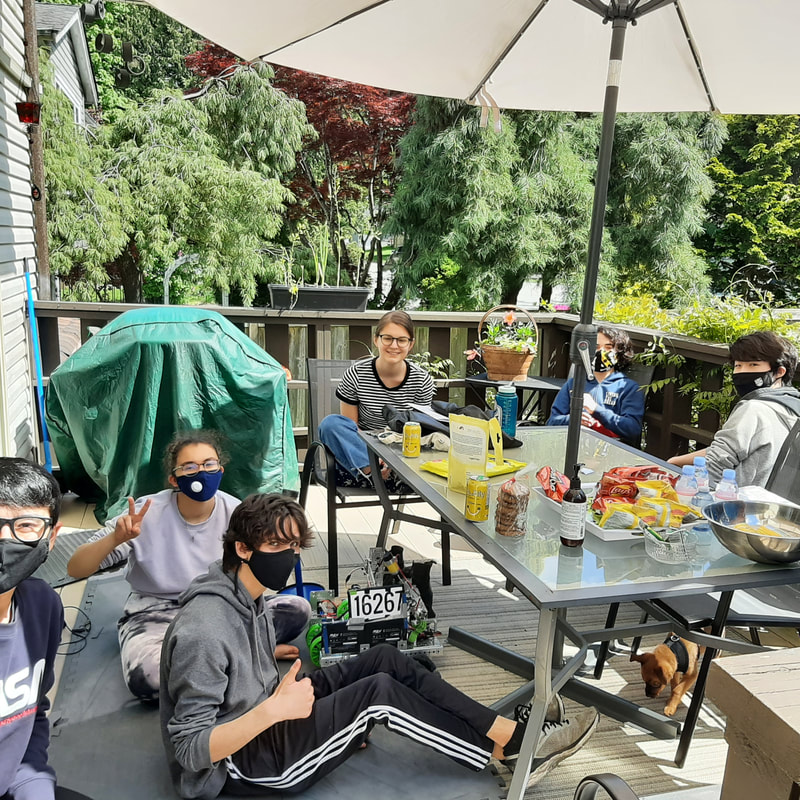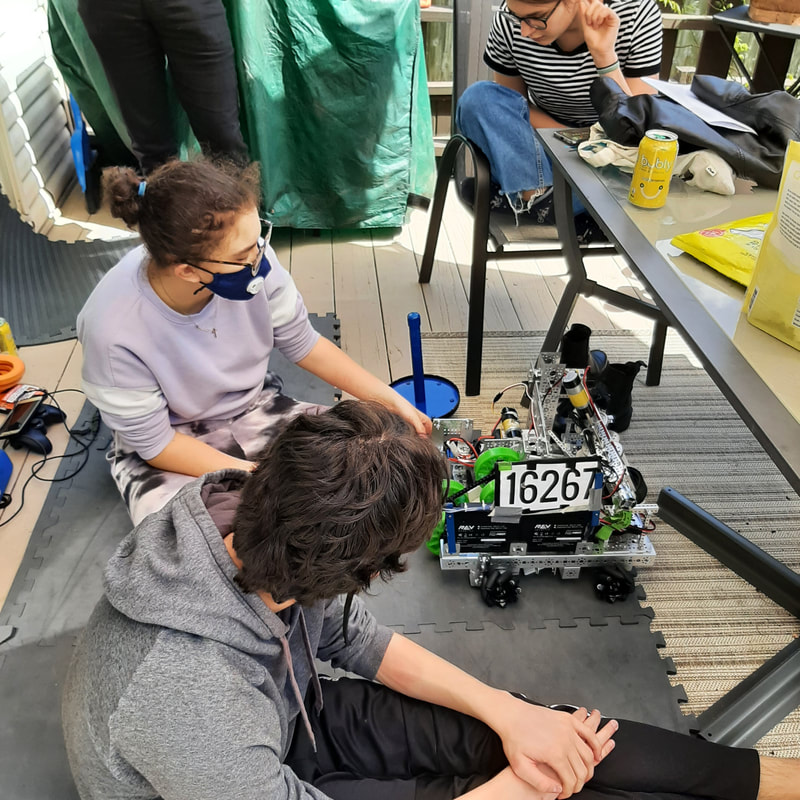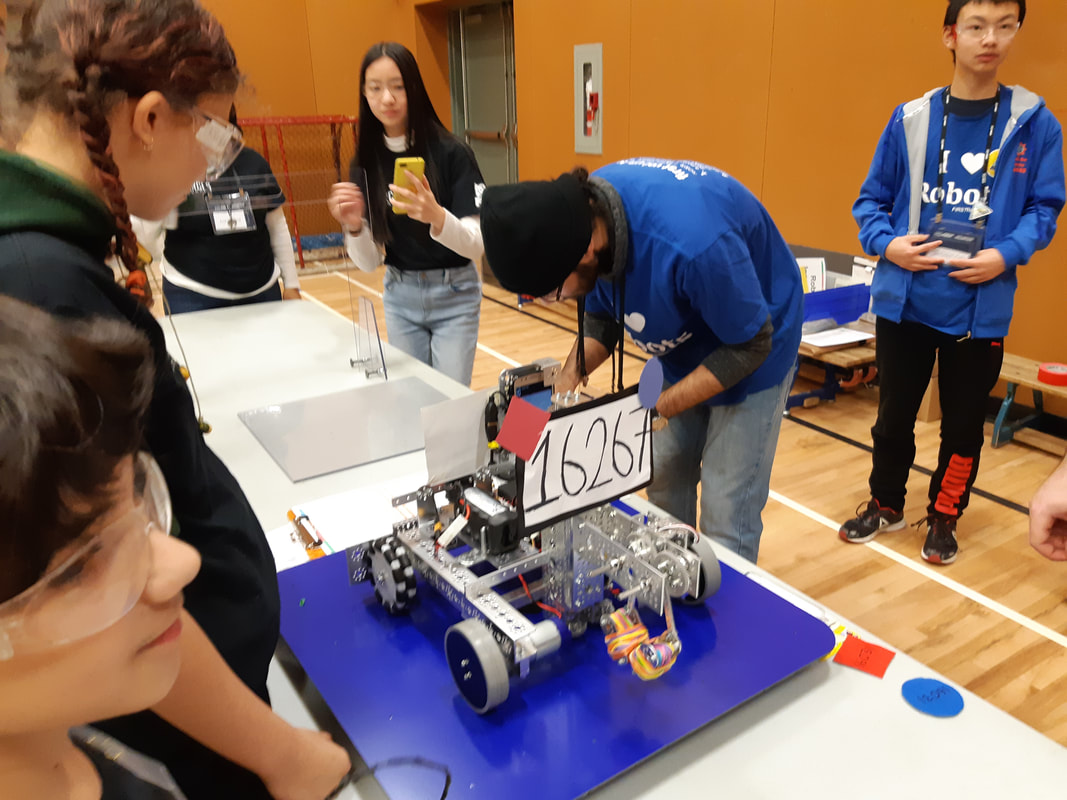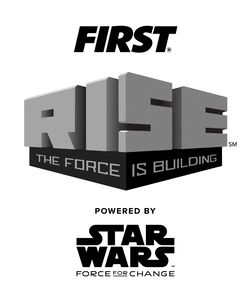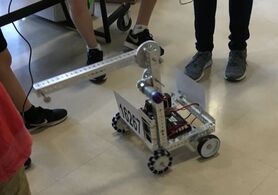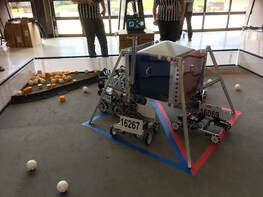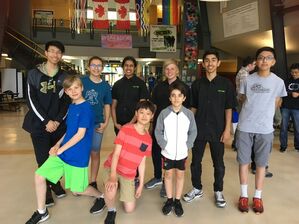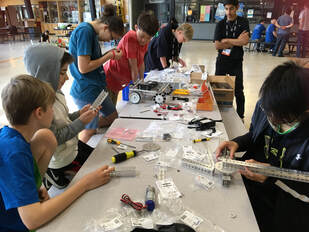Summer Camp 2021 - FLL with Cargo Connectby Kieran P.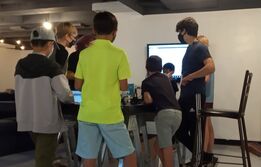 Kieran's programing session Kieran's programing session This past summer we ran a one week long LEGO Robotics summer camp for kids aged 8-12 to fundraise for our upcoming season. We based our camp on the new season’s 2021-22 FIRST LEGO League game, Cargo Connect. What happened at this fundraiser camp, you might ask? Essentially, we condensed an entire season’s worth of robotics competition into a week-long camp to give students a taste of what it’s like to compete in FLL. We divided the group into two teams. Each team got to experience all aspects of a FIRST season, including building and designing a robot, programming the robot, conducting a research project based on an inquiry question, preparing a presentation for a panel of judges, and of course practicing good sportsmanship through Gracious Professionalism. And the kids did an amazing job!!! BUILDING - Both teams designed unique but effective robots that could do a plethora of challenges. Each team took a very different approach to completing challenges on the FLL mat, which was fun for us to see. We held teaching sessions along the way to aid in their robot design process and programming. PROGRAMING - One of the most useful skills the kids learned was how to use sensors effectively to make their robots more consistent. One group went so far as to use two sensors in one program (wow!). They used a colour sensor to follow a line, and a gyro sensor to keep track of their orientation. Overall, we are very proud of both teams for persevering through the challenges robotics throws at you and producing a phenomenal final product. PROJECT - In addition to the robot game, teams are also required to do a research project based on an inquiry question. One team chose the question “How do we reduce emissions in motor sports?” and the other team chose to research “How do sports affect the brain?”. Over the course of the camp, they put together Power Point presentations filled with all the research that they did. Among the topics covered were renewable energy and healthy living practices. CORE VALUES - The teams also learned how to work together and exercise Gracious Professionalism. The core values of FIRST are always the backbone of anything we do, and our camps are no different. We place a heavy emphasis on teamwork, being the best you can be and “Coopertition”, a term coined by FIRST to mean a combination of competing intensely while having a spirit of cooperation with your opponents. It’s always important to remember that the team you compete against can also be your best ally. We teach kids to help uplift each other. Some of these concepts were new to the kids, especially our core values. But by the end of the week they were accustomed to it and could see the benefit. All in all, we had a very successful week of fundraising! Info on Cargo Connect season here and intro video here.
0 Comments
Our PortfolioOutreach We had a couple of Outreach projects such as mentoring a rookie FTC team, hosting workshops for kids to learn about programming and FTC with zoom, and we also volunteered at a school to teach kids about programming and FTC. When we were mentoring the rookie FTC team we tried to tell them tips that we would've wished to know when we were a rookie team or if they had any questions that was relating to our competitions or theirs we would try to answer them. One of the questions they asked us what kit to get for their robot and so we suggested GoBilda because from our experience we thought that Tetrix wasn't very reliable. We also recommended that they would CAD every build they were gonna make because then they could spot a mistake in an online version of their robot instead of their actual one so that it would save more time. For the workshops we used FTC Sim by Pixel Pad which allowed us to teach kids how FTC works without using an actual robot. Strategy Our goal in the beginning of the season was to deliver the wobble goal to the target zone, navigation, score 3 of the high goals for autonomous. For driver control we wanted to score at least 10 rings into the medium or high goals. For Endgame we wanted to place the wobble goal onto the drop zone, and to shoot 3 power shots. But after some leagues we changed up our strategy, we realized that we couldn't score 10 rings so we switched it to at least 6 rings. We were able to achieve our goal, we were able to run a nearly perfect autonomous and we scored 6 rings into the high and medium goals. Design Our robot used REV mecanum wheels for better movement, we left area for an intake device and our drivers base was square shaped. We also have a wobbler goal grabber which had a servo to make sure that the wobble goal would fall out of our grasp. Our intake had a 3D printed ramp that lead the rings with 2 AndyMark compliant wheels into our storage system which could store 3 rings. Our shooter has uses an ark to build up speed for the ring while its in contact with a flywheel. The platform where the ring is going to be shot at was also 3D printed. Programming We decided use Android Studio because OnBotJava had lots of glitches. It took some time to setup Android Studio. The main laptop we were programming on refused to connect to the Rev Control Hub and so we spent lots of time trying debug this issue but we couldn't solve this so instead we used another laptop which worked fine. For driver control the left stick controls the movement of the robot(360 degrees). The right stick controls our the turning. The other buttons and bumpers make the robot to other things like the shooting rings and intaking rings. We made a super class for each of our autonomous programs containing basic functions like driving and turning. For driving we used encoders to increase accuracy, we also use a gyroscope and a webcam to increase consistency. Our robot needs to be able to observe the amount of rings in the starter stack and so we thought that a webcam would be the most efficient method. Our webcam would look at the image and count the rings by counting the amount of orange pixels. Because last year we had issues with inconsistent turns we decided to use the gyroscope that's in the built in IMU in our Rec Control Hub this year. The gyro measures rotation on 3 axes and so we went through the process of trial and error to find the right axes. Meetings We med up online on discord because of the COVID guidelines and in those meetings we would go over what was done and what needs to be done. The robot would at our coaches house and there were times where some of house would go and build some of the robot whilst following the COVID guidelines. We had one gather up at the end of the year to work on the robot one last time. The whole team was there and it was really great to hangout and work on the robot together. We created a workshop to teach kids how to use Pixel Pad which is an FTC simulator that helps you and your team program and test the robot together. We sent an email to school PAC’s about our workshop; we left a link to a google sign up sheet that asked them if they have any past programming experience.
One week after the release of the email, we realized our offer was not that popular as we thought it would be. “It’s free coding classes! Why would the parents hesitate to sign their kids up?” one of our teammates would say. By the time we were a week away from the workshop, we only had 11 kids registered. This obviously was a great disappointment to the team. Can Codes were not something that came very often and we felt like we were losing in on a great opportunity. One way or the other we knew the show had to go on and we decided to move on, but little did we know that our coach had sent this email to her workplace. And the night we had everything setup, we would be surprised to see not 11 but 63 people registered. The team immediately went to work, sorting the kids from beginner, intermediate and advanced. We hosted 3 workshops in the day and each of them lasted for an hour. The workshops were for grades 3-7 but we had the 6th and 7th graders separated in a different workshop because of their age difference from the others. We handled the workshop by making breakout rooms based on experience of programming. We had them program the basic movements of the robot and there were at least 2 of us in each breakout room to help them and share our screens to show them the answer after they all finished one of the exercises. Then before the workshop ended we informed them that they can sign up for FLL or FTC by FIRST. This obviously being our first time doing virtual Can Code, we decided to do a make up class for the first class, in order to deal with technical difficulties the whole time. All in all, our team agreed it was a success and have decided this can be something we can continue to do. There was couple of reasons why we didn't post on the blog and the are mostly about how COVID-19 changed how the team was going to meet while being safe, the whole FTC season, and the building process.
COVID really put us into a hard situation by limiting our resources and our ability to meet and fix problems with the robot. So we figured that we would have a meeting on our regular time, but hosting it on discord. Then we realized that we need a day in the week to make sure all the tasks were being worked on and if there was any new information about anything then we would talk about it on that da, so we scheduled a weekday for just checking in or to give new updates about anything which would last between 30-60 minutes. Building was going to be different because we cant go to our normal meeting and just build so that meant that we had to CAD a lot and that is exactly what we did. The building process was basically each team member would have a part of the robot to CAD so that the two other members with the robot could build it knowing how it should look like and knowing that we know it would work well. If we wanted to make any changes we would always first CAD, then examine the CAD to make sure that it would actually works and then we edit it on the robot. The FTC season was really different from the past seasons because there wasn't any conformations about the time and date for the first league because it all depended on COVID so we had to just make sure our robot was ready before the end of November. That is why we were gone for a while, we were just trying to settle in with how the season was going to work and so we couldn't find time, but now we are back. It was an ordinary day at one of our meetings when our coach revealed the big news of us attending both League events on the weekend. We were originally supposed to go on Sunday, Jan 26th, but some of the teams had to cancel at the last second, opening some spaces on Saturday, Jan 25th. So as soon as the news was revealed, our coach immediately signed us up. She thought it was going to be a good practice for Victoria, and the team agreed.
On Saturday, also known as League 2, our team was met with a couple of surprises. As soon as the teams arrived they were all supposed to get ready for robot inspection, but we couldn't. You see, our robot’s on/off switch was found to be burnt out and so when we proceeded to link our phones together, it wouldn't work. Fortunately, one of the Meadow Ridge teams nearby came to the rescue and let us borrow a spare. With that problem out of the way, another came up. With our first round coming up, our robot’s phone systems would not sync together. We tried multiple times restarting the robot and trying again. We were so lost that in the end we had to go to the Field Inspector, Mike Silverades. After a lot of internet searches, restarting robots and youtube videos, we got them to sync just in time for our first match. League 2 rounds weren’t that interesting and went by pretty quick. Our team ended with 5th place after all the teams finished their 5 rounds. League 3 on the other hand was a different story. As usual we arrived and got ready for inspection. Everything went well until our first round. We were teamed with a pretty decent team so our confidence grew a bit. We started off with our autonomous that we programmed just the day before and watched it work almost perfectly. After the 2 minutes of driver control. The points were tallied up. The board read 42-42 when the team saw it. We had tied our first game. Everybody in the gymnasium gasped in shock and surprise. Ties were a very rare occurrence because of the fact of there being multiple ways to score points. Round 2 went by as quickly and the 3rd one was near, but this time it was different. This time we were teamed with a team of two that built their robot the day before and had no knowledge of FTC. To make the situation more tense, we were going up against the two best teams in the competition, but we still managed to pull off 42-73. As our field crew and programming improved every game, our team pulled off amazing feats in the 5 rounds. In the end, we came in a respectable 6th place out of 10 teams as a first year rookie team. It was also great to meet other teams in our spare time after or before the rounds. During the League 2 event, one of our mentors from Victoria, team FixIt came by to watch. It was great to catch up,talk about our robots and even talk about our strategies for the games. Another nice relationship we shared was with team MIT. For our last round we were teamed up in alliance with MIT and some disagreements came up with the penalty system. You see, the opposite team robots are not allowed to enter or block these taped zones on the map. When the timer reached 1:20, we decided to go to the taped zone, but the opposite robots obstructed our zones. We thought that would be a penalty and just went on with it, but when the final scores came up, the penalty score from the opposing alliance showed 0. Our alliance was quite puzzled, the referees saw it happening and didn’t do a single thing. With these in our minds, we both our team and MIT spoke to the referees and asked politely why the opposing team didn’t get penalized. We later found out that in order to be penalized for blocking, the opposing team must be doing it for at least 5 seconds. After finding out this information we walked back to our tables and accepted the outcome. We are now currently getting ready for the final competition in Victoria on February 22. We still got a lot of work to do, this includes improving our autonomous, practice more for robot control, fulfill a few promised demos and keep raising money through fundraising. We have been pretty good at keeping up with our Engineering Notebook, and have good material for our posters. Stay tuned for another update soon. 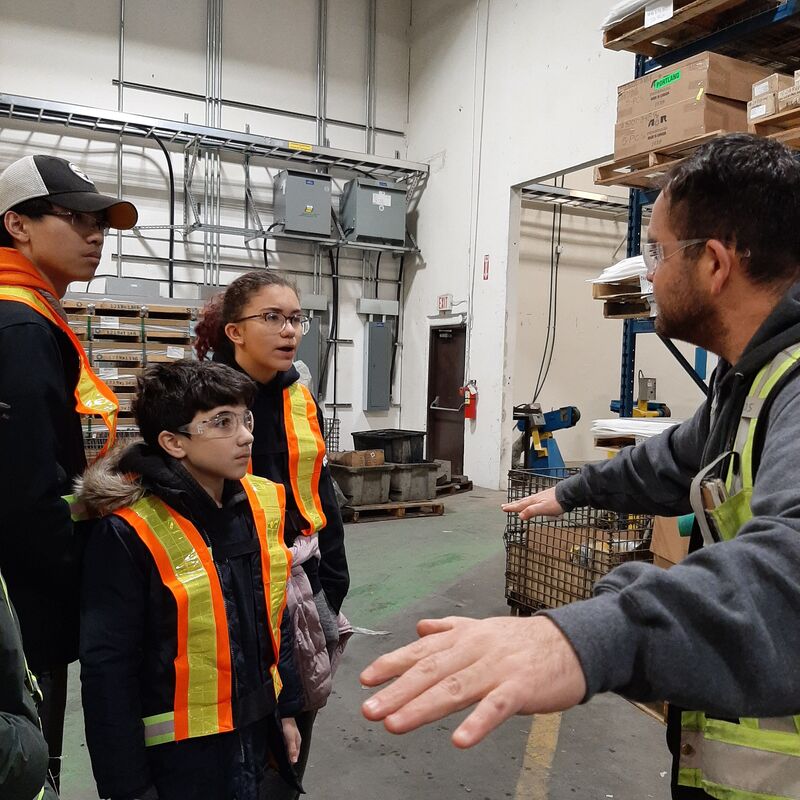 On January 14 2020, Team Forces Unknown went to A&R Metal Industries to introduce the staff to FIRST, and to learn more about their company as well. When we entered the main lobby, we were immediately greeted by one of the staff members, the quality manager named Carlos, who happens to be Coach Ana’s neighbour. Carlos told us what A&R Metal Industries was for and what the jobs in the company entailed. A&R Metal Industries manufactures metal vehicle parts to sell to car companies. They have to make every part without imperfections, otherwise they will be scrapped. He spoke about the importance of treating all with respect, and not pulling rank or treating others with disrespect. He said it was important for his company to consider the ideas of all, and to not ignore other people’s points of view or contributions. Then, Carlos began to show us around the facility, to all of the machines and their functions. There were welding mechanisms, massive machines that poked holes in the metal, machines to bend the metal, etc. After the tour ended, we said our goodbyes, and Carlos invited us to come back to the facility to learn more about it anytime. In turn, we told him about FIRST and FTC, our emphasis on Core Values, and how our team works. At our next visit, we plan to show him our robot. We talked about our need for mentors, volunteers at events, and sponsors. We left him with a few brochures about our team and FIRST, and he invited us to go back to visit again another time. A week later, we visited another company, which specializes in Lithium. We're preparing to a second visit to that company as well. Participating at our first FTC League Event was a big experience. At the beginning it seemed that there was so much to go over, so much to learn. Our aim for this term is to learn as much as we can!
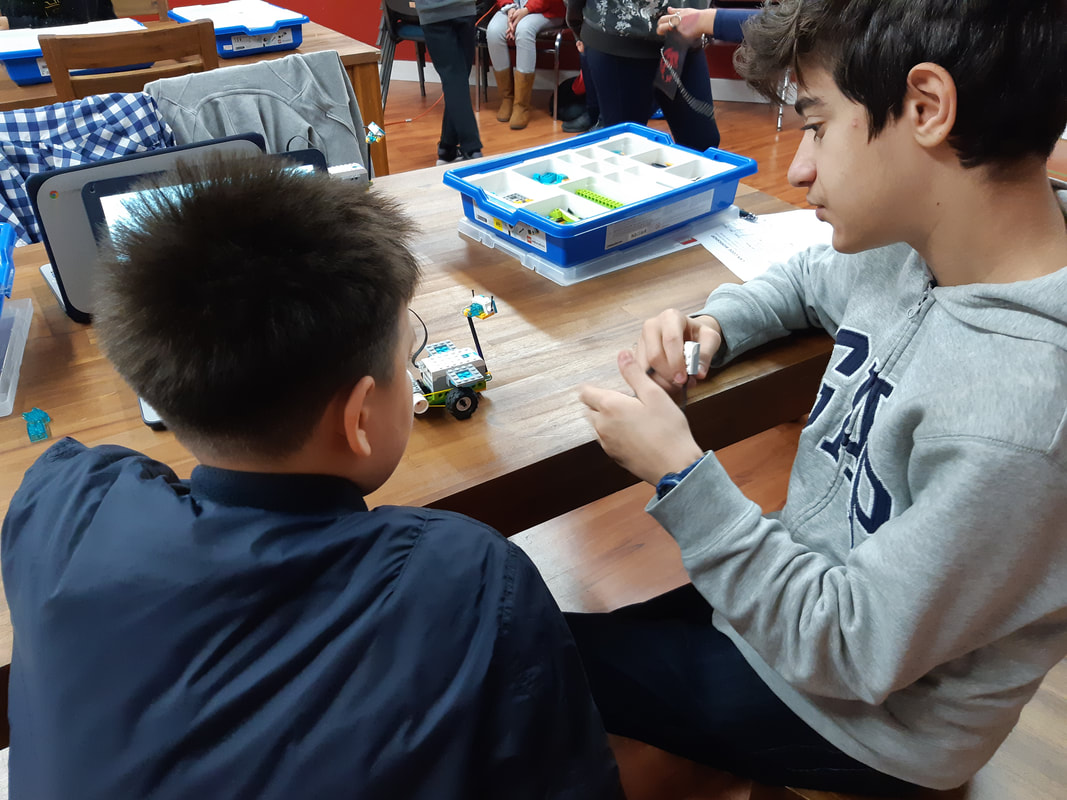 On October 25th, 2019, we went to the Vancouver Aboriginal Friendship Centre Society. When we entered the main lobby we headed down the stairs and into what seemed like the catacombs of the building. After we finished unpacking and setting up, we were ready for the kids to come in. For the workshop, we prepared two different activities, one for kids grade 1-3 and the other, grades 4 and up. For the younger kids, we prepared Lego WeDo sets, and for the older kids, we had Lego Mindstorm EV3 kits. Once the kids came in, Coach Ana introduced our team to them, and after getting to know each other, we moved into the activities. Lauryn was in charge of reception and photography for the event, David and Masiha worked with the younger kids, helping them with the instructions, and Matthew, Sarah, Lulu, Kyoungjoo, and Kieran worked with the older kids. The activity for the older kids was more complex. they got to work with the Mindstorm kits. We pre-built the robot for them to work with, we introduced them to the programming software. We also taught them about how the motors work and how the robot could take different turns depending on the way that the robot was programmed. They were easy to teach and they learned a lot. We were impressed by their intuition, and their approach towards the completion of the activities we gave them. After we finished with the robots we gathered all the kids to conclude the session. The kids had a lot of fun with the robots and we enjoyed working with them. After the kids left, we reviewed the successes of the class, and the ways in which we could improve our teaching abilities. Coach Ana also asked each of us what we enjoyed about the class, and how we could make the next CanCode event better. Today a FIRST Season Launch took place at the MacMillan Space Center in Vancouver, and was opened to the public in order to raise awareness about FIRST programs. There were teachers, parents, returning teams, students, volunteers and other FIRST fanatics. There were booths and stations for all four FIRST programs and their new seasons: Boomtown Build for First Lego League Junior, City Shaper for First Lego League, Skystone for First Tech Challenge, and Infinite Recharge for First Robotics Competition.
There was a station for each of the four FIRST leagues. Kyoungjoo, Masiha, and I managed the station for FLL, where we taught children over grade four the basics of programming for EV3 using LabView. We showed them how to make their robot move forward, turn at right angles, and sense distance. The FLL Jr station was managed by volunteers of the FIRST community. The FTC station was managed by Lulu, another member of the team, where she showcased our robot to the people walking by. Lastly, the FRC team 7796 - Breaker Robotics from Burnett Secondary in Richmond also volunteered their time in the FRC station, showcasing their own robot to everyone at the event. Later on, during the FIRST Launch presentation, our team was asked to share about our experience at the World Championship in Houston, Texas, last April. I told the public how fun it was to meet people from other countries and make new friends there. It was inspiring to see what the other teams had come up with for their projects and robots. Having returned from the FIRST Championship games in Houston less than two months ago, the team is ready to 'graduate' from the amazing FIRST LEGO League and move into the exciting FIRST Tech Challenge league! Our team, with the addition of previous mentor Matthew Wong (Gr. 11), attended the FTC Jump Start Scrimmage held at Kwantlen Park Secondary on June 1, 2019. We had already ordered a tetrix robot kit, but since it had arrived only the day before, they attended the event with their brand new kit still unopened. At the event, we met other new teams that also needed help getting started, and there were 2 amazing local teams were there to meet the demand of the wide-eyed rookie teams. The seasoned teams were incredibly helpful in helping rookies figure out how to connect remotes and quickly build a chassis for a simple rover. By the end of the day Forces Unknown had a 'working' robot and were able to play a quick game with some of the other teams using materials from the 2018-19 Season. We are thankful to all who made the event possible. Also, we are grateful to the Provincial Government for the FIRST Tech Challenge British Columbia New Team Grant with which we were able to register the team and purchase a starter robot kit. As we all wait for the launch of the new season, we are very excited to continue participating FIRST programs and look forward to what FTC has to offer!
|
